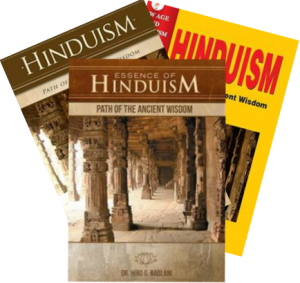The birth of Hinduism coincides with the superior development of the human mind, sumati. With the advent of higher brain about fifty thousand years ago, man took longer strides toward mental awakening and spiritual consciousness. There is evidence to suggest that various prehistoric tribes passed through India around this period. Harnessing the mind in a spiritual manner to make it noble, sattvic, and non-hurting has been prompted by Hindu Rishis through the ages.
Hindu culture is the immaculate quintessence of a profound ancient philosophy. Promoting an open-arm culture, it allows for freedom within the bounds of responsibility.The sense of duty and sacrifice is the foundation of Hindu culture. It inspires compassion, love, respect, humility, and modesty in all spheres of activity.
There may be some controversy regarding the origin of Aryan community that is associated with the creation of the earliest scriptures of the Hindu religion. But there is no contest that the seed of Hindu thought sprouted first in the holy land, Punya Bhumi, of India. Chains of Rishis meditated on riverbanks, mountaintops, and in the forests. In their deep sojourns, they established a secure communion with the Divine. From this spiritual union, they heard the inner voice of God and created thousands of sacred hymns, which would then form the eternal Vedas. The Vedas were not written by a single author but by many highly enlightened and virtuous masters. These scriptures attained supreme authority, one which is still considered sagacious. Hindu theology, however, soon charted a new direction. The old teachings were respected and revered but subtly changed as the situation and circumstance demanded. Dynamic character became visible, but no force or violence was deployed.
Changes came in succession through the Upanishads, the Bhagavad Gita, the Srimad Bhagavatam, and many other Holy writings. Through more such changes, new religions like Jainism, Buddhism, and Sikhism came into being. Many new sects, or sampardaya, also organized. New ideas percolated, giving an impetus to grow and survive through oncoming challenges. The dynamic character of Hinduism became well established, with a free flow of ideas and philosophies. Jain scriptures stress the phenomenon of different points of view—anekta— making way for a more restrained and rather non-dogmatic approach to various problems—a crying need for our contemporary situation. In our own times, the energetic roar of Swami Vivekananda became the bugle of another major reform movement. He boldly carried the message of his guru Sri Ramakrishna that all religions are but manifestations of one supreme truth. He reaffirmed that true religion lies in the transformation of our inner being (antahkaran); service of the poor and needy became more valid and relevant than empty, prolonged rituals. He regarded service as karma yoga. Any form of good and useful service rendered with sincerity and unselfishness merits as good karma, and spiritually rewarding. He also taught that religion need not be in the hands of a few learned priests; we all may learn the principles of religion and use these in everyday living. These changes are not new as these were described in the ancient Vedas, too, but we often need wakeup calls. The great swami even proclaimed, “There is nothing like a closed book on Vedantism. Something, which is considered useful to human society, may be adopted at any time.” 116 Hindu Society today has the good fortune to be guided by many living sages, saints, and swamis. Lately, India has taken giant strides in economic fields. It has adopted a secular constitution, guaranteeing freedom of religion to all subjects. Just as science has brought many material benefits to the people, it is religion that enhances the quality of the mind. A truly religious person, belonging to any faith, would always abide by the spiritual values of truth, love, and compassion. Science has grown due to the sharing of its knowledge among different countries of the world. The new spirit of interfaith, too, may be of use to human beings once its spiritual values and principles are shared.
Hindus are at the threshold of a major transformation. After centuries of subjugation, they are now making bold and mammoth progress in various fields. They live in most countries of the world, and their contribution toward religious development is obvious in all places. Hindu temple activities have made a tremendous impact in recent years all over the globe. A Hindu temple is regarded as the home of God, where any devotee, Hindu or non-Hindu, may walk in and find solace and peace. Religion always plays a major role in the lives of Hindus. Living a good material life alone, however, is not the end in itself; it is rather imperfect—apara. But aiming to live a virtuous and moral life by using the tools of material and scientific advantages would be considered a perfect goal—para.
The future decades may prove to be challenging for Hindus in many ways. Synthesizing modern science with traditional religious activities may bring forth golden opportunities previously unimagined. Hindus would do very well to build ultramodern, hygienically superior and finely comfortable places of worship, where they may spend most of their spare time in search and practice of higher values of the Divine. The mega temples of yore are a clear inspiration in this direction. The serenity, which is the heart of the temple, may not be however compromised by the ostentatious and glitzy decor. The day has perhaps dawned where Hindus now boldly adopt the look of a new age, discarding the ragged and dilapidated appearance of yesteryear, reminiscent of slavery and poverty. They may even accept the good practices of other faiths without feeling embarrassed. Learning from any source is always a sign of progress; not learning is shameful ignorance.
Even so we may well remember that ‘temple service’ always forms an important part of the religion. Doing any work allotted in the temple, and especially the menial work is an effective way to reduce pride and increase humility. Opportunities for such humble work are always present in all ashrams and temples all over the world. Many of the highly placed devotees who helped build the Swaminarayan Temple in London (and else where) took leave for months, even years, from their professional work, and labored twelve hours a day to build that magnificent edifice.
Often modern Hindu youth is unaware of the grand ancient tradition of their religion. They may well remember that Apple founder Steve Jobs and Facebook founder Marc Zuker had gone to India and visited Hindu temples before starting their ventures. There are several similar examples of leading personalities of the world, alleging their faith and interest in Hindu philosophy. Parents, who are often the first generation immigrants in US have been too busy stablishing themselves economically, have been rather negligent about religion themselves. There is need to pay serious attention to this aspect, especially for the sake of proper development of future generations.
Maintaining a sense of brotherhood and love for others is the basic principle of Hindu spirituality. Helping and serving others, whatever may be their religion, is the moral duty of every Hindu. Prejudice, hatred, and undue criticism for people of other faiths are seriously harmful for our own growth. Hindus may do well to remember the lessons of tolerance and kindness (Daya) taught through ages by their own seers and saints. Respecting others and maintaining harmony and peace—shanti—are some cherished values of the Hindu philosophy. We should always treat the whole world as God’s one large family, Vasudhaiva Kutumbkam. Only then will we earn true joy—ananda—in our lives.
This book is especially dedicated to the Hindu Youth Diaspora that is now settling in many countries. There are some protocols and conventions that all immigrants should follow when they choose to live in other lands. Loyalty and integrity form the basis of such conventions. Observing the laws of the land is mandatory for all, perhaps even more so for immigrants. Hindus in foreign countries should conduct themselves as virtual ambassadors of India. They may serve and love their new country with complete sincerity and honesty without disrupting the roots with the country of their origin.
Many Hindu parents in US do not coach their children about our religion properly. They are unwilling and also perhaps unable to do this important duty. Most of the parents perhaps got so busy establishing their careers; they lost sight of this vital aspect of their own life..
True spirituality, simply stated, is living a life of virtue and ethics. Tolerance (sahan Shakti), not confrontation, has always been the watchword of Hindu philosophy. They may do well to recall the old decree of Mahabharat: Tasmat tikshnataram mridu— “By gentleness one can overcome the greatest difficulty in the world.” Religion teaches us to remain patient and restrained in all situations. Criticizing and condemning often makes things worse. There may be many customs and rituals in our own faith as well as in the faiths of other people that do not appeal to us. Hindu society has always adopted a soft attitude of tolerance in this regard. Religion is essentially a very personal and private matter. Any interference is, therefore, not called for.
Our scriptures also do not commend self-praise. In fact, any pleasure in listening to one’s own adulation is severely discouraged. Modesty is valued in Hindu society. Doing noble and good deeds, which win other people’s acclamation, is hailed as a virtuous act.
Despite some inevitable mistakes, there are several noble and glorious achievements that the Hindu culture can be proud about. The book attempts to acquaint the Hindu Youth Diaspora of their grand heritage and restore their pride and confidence in their own ancestry. True religion brings out the highest values in an individual. The spiritual virtues taught in the Hindu religion, as in all other religions, are our best assets in life, more than secular education, financial security, and military strength. Every generation acquires many traditions—the best of the past that has been carried forward for the future. It then becomes the responsibility of the future generation to handle these traditions with wisdom and maturity. Albeit some changes are inevitable, they may be implemented only for the better with care and discretion. Respect for elders is a keystone of Hindu culture. Hindu Rishis, throughout millennia, have always stressed the spiritual values of truth, integrity, love, forgiveness, compassion, and humility. Often, we run after material possessions, compromising our moral and spiritual principles. We may liken this to the old saying, “collecting the dust, and throwing away the gold!” For Hindus, the moral teachings of religion have always been the bedrock of good living.




